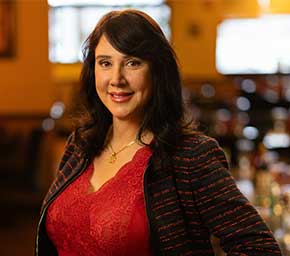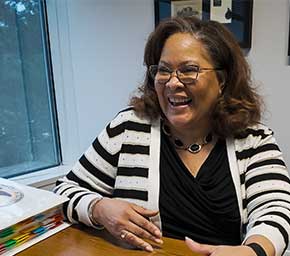TOP RESUME-WRITING TIPS
Prepare for a career in tourism and hospitality by building a professional résumé that highlights your work experience and skills. From formatting the page to customizing your skills with keywords, these tips will help you write a résumé that stands out.
01
CHOOSE THE
RIGHT FORMAT:
- Chronological: This lists your work experiences starting with your most recent job. It’s suitable if you have a consistent work history.
- Functional: This focuses on your skills rather than your work history. It’s good for those with gaps in employment or changing careers.
- Combination/Hybrid: This combines elements of both chronological and functional formats, highlighting skills and work history.
02
CONTACT
INFORMATION:
- Include your full name, phone number, email address and optionally, your LinkedIn profile or professional website.
- Ensure your email address is professional (it should include your name).
03
PROFESSIONAL
SUMMARY/
OBJECTIVE:
- Write a clear statement that summarizes your experience and career goals.
- Tailor your professional objective to the specific job you’re applying for.
04
WORK
EXPERIENCE:
- List your previous jobs in reverse chronological order.
- Include the company name, your job title, dates of employment, and a brief description of your responsibilities and achievements.
- Use bullet points and action verbs (e.g., “managed,” “coordinated,” “led”) to describe your accomplishments.
05
ACHIEVEMENTS
AND QUANTIFIABLE
RESULTS:
- Highlight specific achievements and outcomes from your work experiences.
- Whenever possible, use numbers to show your impact (e.g., “increased sales by 20%,” “managed a team of 10 employees”).
06
SKILLS:
- Include a skills section that highlights relevant hard skills (e.g., food safety and sanitation, food preparation) and soft skills (e.g., problem-solving, communication)
- Tailor this section to match the skills mentioned in the job description.
07
EDUCATION:
- List your educational background, including the name of the institution, degree earned, major and graduation date.
08
CERTIFICATIONS
AND TRAINING:
- Include any relevant certifications, workshops or training programs you’ve completed.
- If you’ve won a relevant award or accolade, you can also mention that.
09
KEYWORDS AND
TAILORING:
- Customize your résumé for each job application by using keywords from the job description. For example, if the job posting asks for someone with experience in customer service, use the term “customer service” on your résumé..
- This will help your résumé pass through applicant tracking systems (ATS) and show you’re a good match for the role.
10
DESIGN AND
LAYOUT:
- Use a clean and professional design.
- Ensure consistent formatting for headings, bullet points and fonts.
- Avoid overly complex designs or too many colors; a well-organized Microsoft Word document is your best bet.
11
LENGTH:
- Make your résumé one page. However, if you have extensive experience, two pages can be acceptable.
12
PROOFREADING
AND GRAMMAR:
- Thoroughly proofread your résumé for any grammatical or spelling errors.
- Consider having someone else review it as well.
13
REFERENCES:
- It’s usually not necessary to include professional references on your résumé. You can provide them separately if requested.
14
UPDATE
REGULARLY:
- Remember, your résumé is your marketing tool, so focus on presenting yourself in the best possible light while being honest and accurate.
- Tailor your résumé for each job application and be prepared to discuss the experiences and skills you’ve highlighted in the document during interviews.
Frequently Asked Questions
Focus on clarity, professional design and showcasing accomplishments that reflect your strengths. Use action verbs and keep the layout clean and easy to read.
If unrelated experience demonstrates transferable skills like teamwork, customer service or leadership, include it. Tailor descriptions to highlight relevance to the tourism and hospitality industry.
While not required, a well-crafted summary can grab attention by highlighting your unique qualifications and career goals up front.
Keywords help your résumé pass applicant tracking systems (ATS) and show you understand the role’s requirements. Always align your language with the job description.
Avoid excessive graphics, overly long descriptions and personal details like photos, age or unrelated hobbies. Stick to what’s relevant and professional.
Update your résumé whenever you gain new skills, certifications or experiences. Keeping it current makes applying to new opportunities quicker and easier.
Yes, templates are helpful for creating a professional design, but customize it to reflect your personal achievements and avoid generic content. There are even résumé-building tools like Resume.io.


